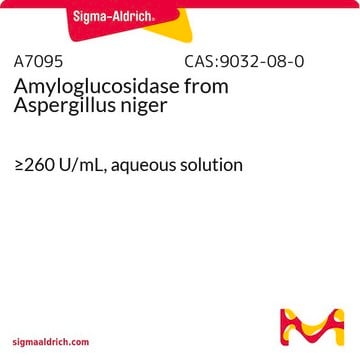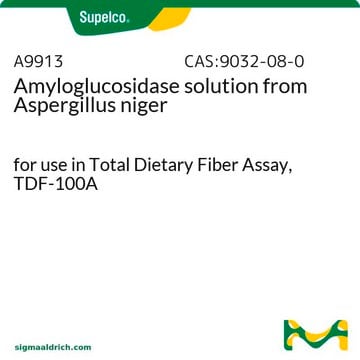A3403
α-Amylase from Bacillus licheniformis
Type XII-A, saline solution, ≥500 units/mg protein (biuret)
Synonym(s):
Termamyl® 2X, 1,4-α-D-Glucan-glucanohydrolase
About This Item
Recommended Products
type
Type XII-A
form
saline solution
specific activity
≥500 units/mg protein (biuret)
mol wt
57.6 kDa
greener alternative product characteristics
Waste Prevention
Design for Energy Efficiency
Learn more about the Principles of Green Chemistry.
sustainability
Greener Alternative Product
greener alternative category
storage temp.
2-8°C
Looking for similar products? Visit Product Comparison Guide
Related Categories
General description
We are committed to bringing you Greener Alternative Products, which adhere to one or more of The 12 Principles of Greener Chemistry. This product has been enhanced for energy efficiency and waste prevention when used in starch ethanol research. For more information see the article in biofiles.
Application
Biochem/physiol Actions
Caution
Unit Definition
Physical form
Legal Information
substrate
Signal Word
Danger
Hazard Statements
Precautionary Statements
Hazard Classifications
Resp. Sens. 1
Storage Class Code
10 - Combustible liquids
WGK
WGK 2
Flash Point(F)
Not applicable
Flash Point(C)
Not applicable
Personal Protective Equipment
Regulatory Listings
Regulatory Listings are mainly provided for chemical products. Only limited information can be provided here for non-chemical products. No entry means none of the components are listed. It is the user’s obligation to ensure the safe and legal use of the product.
JAN Code
A3403-VAR:
A3403-BULK:
A3403-500KU:
A3403-5MU:
A3403-1MU:
Certificates of Analysis (COA)
Search for Certificates of Analysis (COA) by entering the products Lot/Batch Number. Lot and Batch Numbers can be found on a product’s label following the words ‘Lot’ or ‘Batch’.
Already Own This Product?
Find documentation for the products that you have recently purchased in the Document Library.
Customers Also Viewed
Protocols
Follow our procedure for the determination of alpha-Amylase activity. This enzymatic assay of a-Amylase guides you through the entire process and necessary calculations.
Our team of scientists has experience in all areas of research including Life Science, Material Science, Chemical Synthesis, Chromatography, Analytical and many others.
Contact Technical Service













